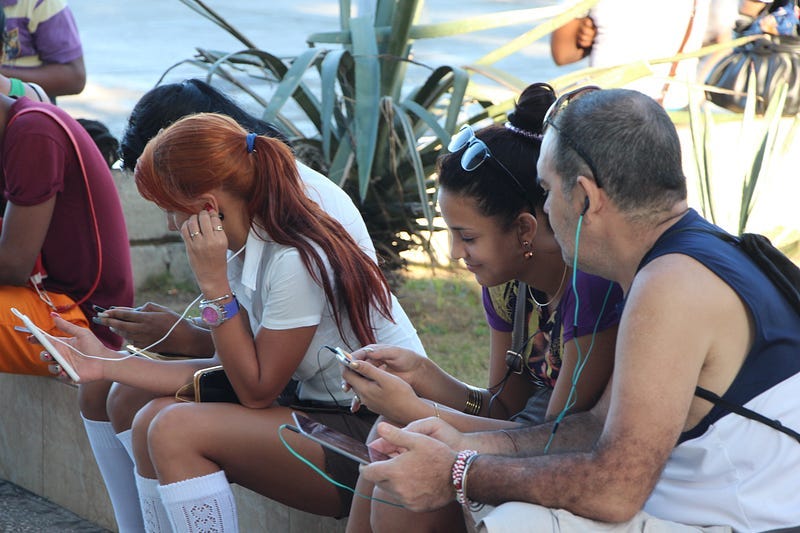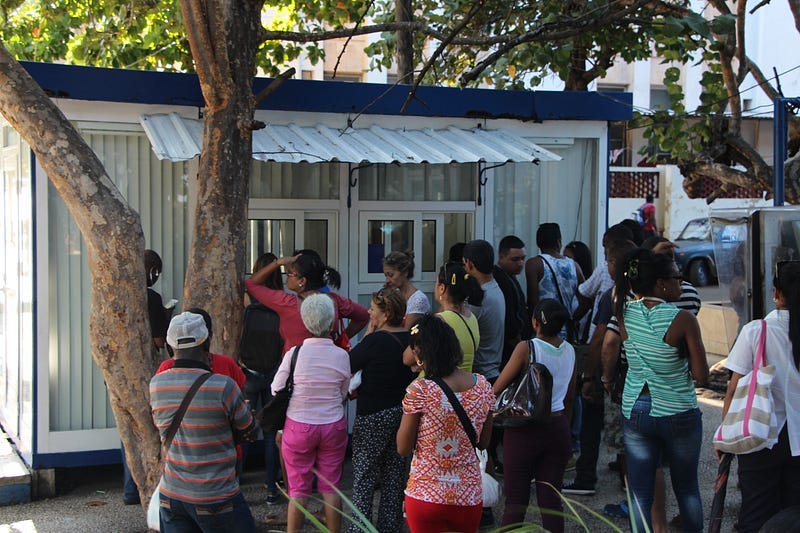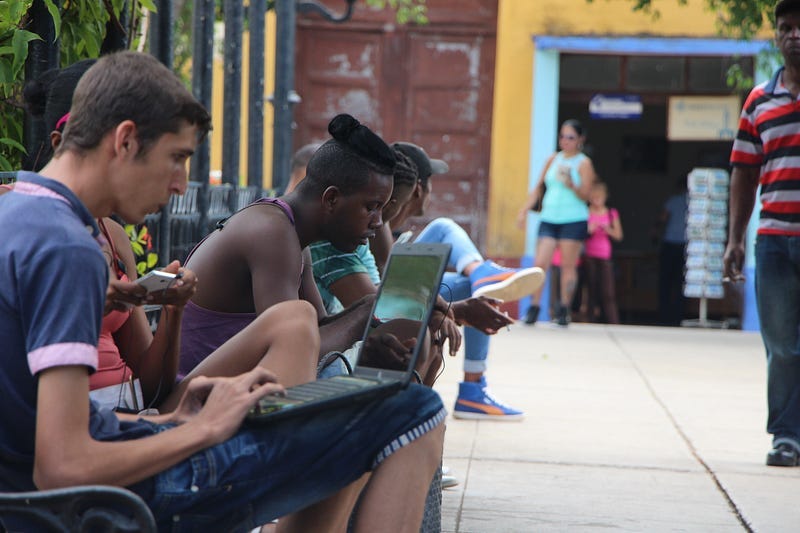The internet has arrived in Cuba — and it is bittersweet
It was a peculiar sight. I had been in Cuba for 2 days without seeing a single smartphone. There it was: the public Wifi hotspot. A very…
It was a peculiar sight. I had been in Cuba for 2 days without seeing a single smartphone. There it was: the public Wifi hotspot. A very public hotspot. Dozens huddled together in the heat glaring at their screens — some sitting on benches, others on the ground: Cuban teenagers browsing youtube on their Samsungs; Canadian tourists checking work mail on their iPhones; and older Cubans video conferencing with relatives — a cigar in hand. Many had paid a small fortune for the access card — $1, or the equivalent of a 2 day salary. And it was temporary: the access card only lasts for 30 minutes. That’s the state of internet in Cuba today.
Ever since the Internet was invented, Cubans were left in the dark. Fidel had judged correctly that opening up information would pose a threat to revolutionary ideas — already under threat during the Período Especial, the Cuban economic crisis of the 90s that followed the fall of the Soviet Union. Ask Cubans however, and many point a finger to El bloqueo, the US Embargo in place since 1960. My initial reaction to this opinion was skepticism. But a quick look at a map of underground caribean cables shows a tangle web of connectivity that bypasses Cuba. That the only cable reaching the country, the ALBA-1, was financed by the Venezuelan government further validates their point. It was a common theme: debating whether Fidel vs el bloqueo is to blame for the suffering of Cubans, the only certainty their suffering.
In July of this year, it all changed. In a surprising move, the government opened up the Internet to everyone — albeit with conditions. In addition to the hefty price tag it requires an identification card — the government official wrote down my passport number against the access card number; it’s only available via WiFi (Thanks to being late to the party, Cubans bypassed the cable phase and will never have to deal with Comcast); And it’s only accessible in public squares.
When I asked for directions to the office of Etesca, the state telecommunication operator and the only distributor of access cards, I was told a ten minute walk and an hour and a half wait. It was not a joke. Outside the office, a couple dozen Cubans were waiting In their infamous queues. Looking like a mess, the queue actually had a strict social order to it: Whenever a new person would show up, they politely ask for El ultimo, the person currently last in the line, then take the Ultimo spot. For 60 years Cubans have stood in these lines to buy anything — from basic cooking supplies to the occasional piece of pork or chicken. They did not seem to mind standing in line to get access to a glimpse of the outside world.
Availability was spotty: the first day I bought 2hour access in Havana, the next day they were totally out. In Trinidad supplies were running low so cards were rationed to 1 hour per buyer. Outside, scalpers were selling the cards for a 100% premium.
Whatever Internet they got was surprisingly fast — I measured about 1 Mbps for downloads and uploads. The constraint on time and place creates interesting habits. Some practices — writing an email offline then sending it once connected — are reminiscent of the early internet days. Others are absent: when I asked about dating apps I got back a rather confused look. And some practices around conferencing are truly novel. In many instances, multiple members of a family were huddled around one small screen to video conference with distant relatives. In one instance, a father was video conferencing while his teenage son was watching a muted youtube video in an adjacent window. Their card ran out after a few minutes. The father sighed in frustration. It was painful to watch.
But perhaps what’s truly uniqe about internet access in Cuba is the public nature of it all. At a time when the Internet is associated with social isolation, Cuba is a sweet reminder of a time when the Internet was exactly the opposite: a means for brining people together. Going to Cuba is often described as a trip to a different time more than place. The Cuban Internet is no exception.







